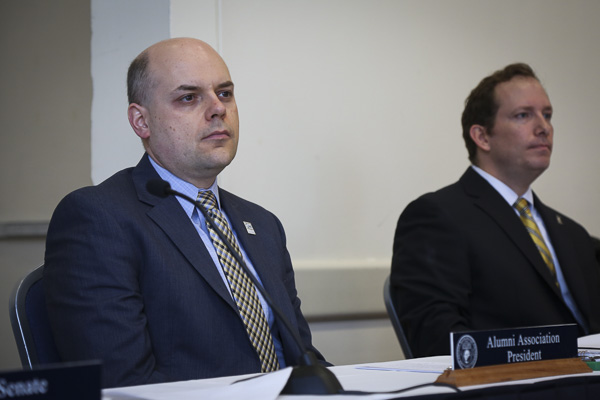The Alumni Association is piloting a new outreach system this month with the hope of methodically increasing alumni engagement.
Members of the association’s executive board say the Alumni Ambassadors program will increase alumni engagement – and eventually donations – by contacting individual alumni directly. They hope that through developing one-on-one relationships, alumni will be motivated to attend events and volunteer.
The board expects to fully launch the program in the spring, but the pilot will begin ahead of the upcoming Alumni Weekend. They say the program will give the association a framework to measure their progress in a formal way, keeping track of the association’s long-term work and results.
Matthew Manfra, the associate vice president of alumni relations, said the Office of Alumni Relations has pledged to be resource for the association in programs that increase alumni engagement.
“The GWAA is looking for more ways to enhance engagement and interaction among the University’s worldwide alumni network, and this type of program creates one-on-one, personal contact opportunities to build deeper connections,” Manfra said in an email.
Alumni have been giving back at a rate of about 10 percent, a relatively low number compared to the rate of donations at the University’s peer schools. The association has attempted to raise this rate through campaigns like donation matches and alumni recruitment to advisory boards.
Jeremy Gosbee, the president of the Alumni Association, said the ambassadors who double as the association’s executive board members will use one-on-one relationship building to target geographic regions with low alumni volunteer engagement.
“We’ve got upwards of 50 regional networks and they all have kind of a steering committee that has active alumni involved in that city, but they haven’t necessarily been first to come back to D.C. for Alumni Weekend,” Gosbee said.
Aaron Binstock, the vice president for communication on the association’s executive board, said the new program is essentially a more formal version of the outreach that already happens, and he expects the challenges with this new program to be no different than what the association’s outreach efforts usually face: getting people to take the time to answer phone calls and directly engage with them.
“Alumni sometimes react much better to getting a call from another alum than from the University, whether it’s about attendance or an issue or whatever,” Binstock said.
Despite the challenges, Binstock, who is one of the members spearheading the program, said the ambassadors will provide additional engagement to bolster the alumni network’s culture of philanthropy and to allow the executive board to better represent the network.
“If we have a direct line of communication for our constituents, then it’s a much better communication tool and we can be better liaisons for them with the current University staff and administration,” Binstock said. “We know that there is power in the “peer-to-peer” approach – alumni may be more interested in getting involved when they are contacted by a fellow GW graduate.”
The association plans to widen the ambassadors program beyond Alumni Weekend to encourage participation in other social events and spur discussions about alumni issues.
“When alumni volunteer to serve as board members for the alumni association, part of what they’re volunteering to do is to interact with alumni,” Binstock said.
Michael Penn, the senior director of communications and marketing for Duke University’s alumni association, said that programs like this one are often successful because alumni respond well to personal efforts.
The alumni association at Duke doesn’t run a full-time ambassador program, but it does utilize a brief ambassador program to help promote events like reunions.
“It’s far far more effective for them to hear from a friend, ‘Hey I’m going, I hope you’re going too’ than it is for us to just be saying, ‘We hope you come, maybe your friends will be there, maybe they won’t,’” Penn said.





